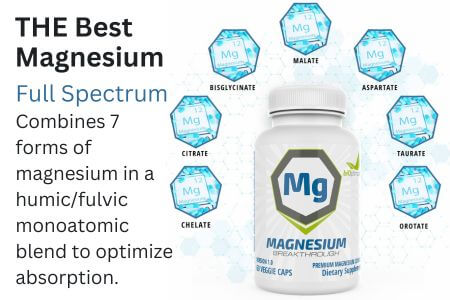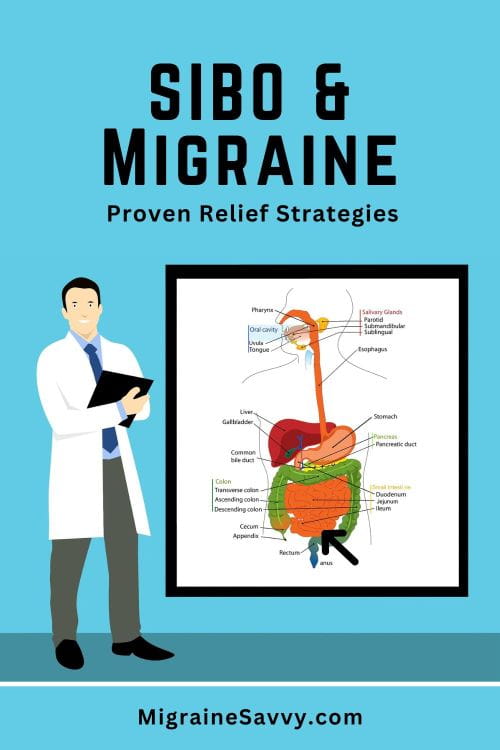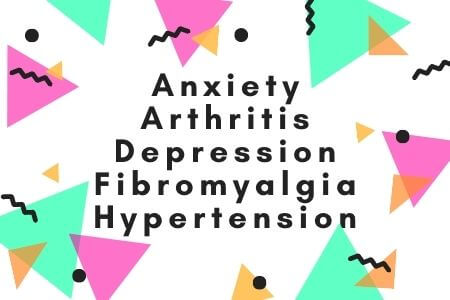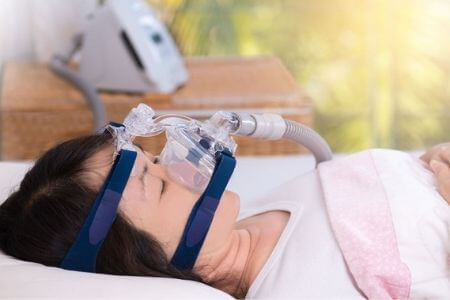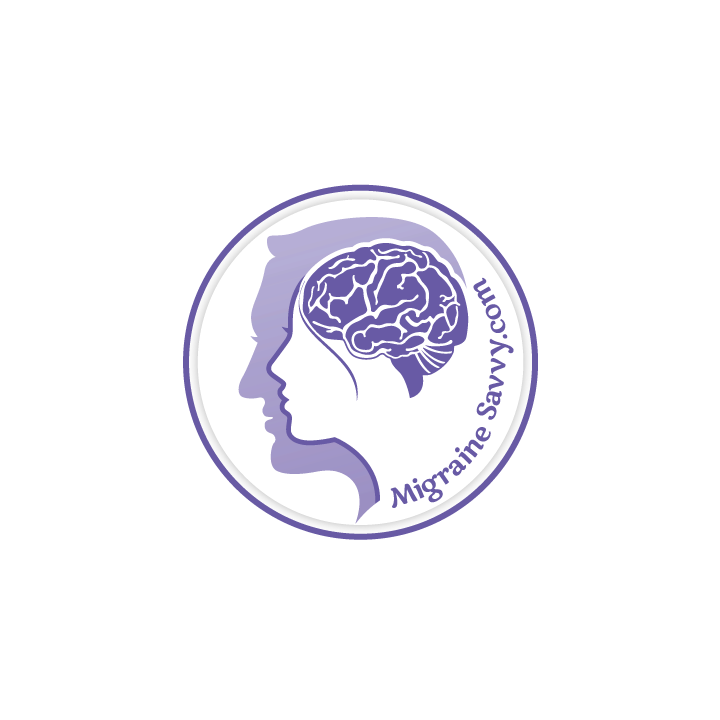- Home
- Associated Conditions
- Sibo and Migraines
SIBO and Migraines: The Hidden Connection & How to Find Relief
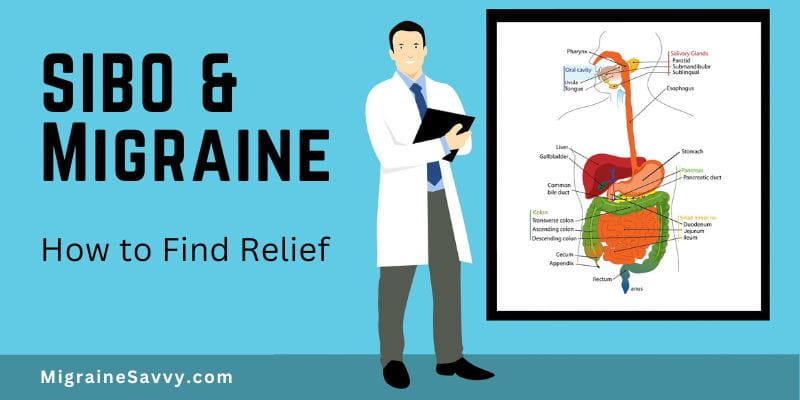 How SIBO and migraines are linked - and what you can do about it.
How SIBO and migraines are linked - and what you can do about it.
If you're struggling with migraines and digestive issues, you're not alone. Small Intestinal Bacterial Overgrowth (SIBO) could be an underlying cause of migraine attacks. Research suggests that gut imbalances, inflammation, and nutrient deficiencies triggered by SIBO may directly contribute to migraine headaches.
In this article, I'll break down:
- How SIBO can trigger a migraine attack
- Symptoms that suggest you might have SIBO
- Natural and medical treatment options
- The best diet for reducing SIBO and migraines
If you're ready to take control of your health and reduce both SIBO and migraine attacks, keep reading.
 SIBO and Migraines: How to Find Relief!
SIBO and Migraines: How to Find Relief!What Is SIBO and How Does It Impact Migraine Attacks?
SIBO stands for Small Intestinal Bacterial Overgrowth. It happens when bacteria that belong in the large intestine overgrow in the small intestine, leading to fermentation, gas, bloating, and inflammation.
This bacterial imbalance can affect brain function, making migraine attacks worse.
SIBO (C) = Constipation
SIBO (D) = Diarrhea
 SIBO & Migraine Attacks: The Gut Connection You Need to Know!
SIBO & Migraine Attacks: The Gut Connection You Need to Know!How SIBO Triggers Migraine Attacks: The Gut-Brain Connection
1. Inflammation & The Gut-Brain Connection
SIBO causes low-grade chronic inflammation, leading to pro-inflammatory cytokines (IL-6, TNF-α, IL-1β). These can cross the blood-brain barrier, triggering neuroinflammation and migraine pain pathways.
Currently, sufficient evidence exists linking the increased frequency of several GI disorders with migraine compared to the general population. The gut-brain axis plays an important role in the association between GI disorders and migraine.
~ Cámara-Lemarroy, Carlos R et al. [5]
2. Serotonin Dysregulation (Your Mood & Migraines)
90% of serotonin is produced in the gut.
SIBO disrupts serotonin production, leading to mood imbalances and migraine susceptibility.
3. Histamine Intolerance & Migraines
SIBO is linked to histamine intolerance, which can cause headaches and migraines by dilating blood vessels in the brain.
High histamine foods like fermented foods, aged cheeses, and wine can worsen symptoms.
4. Nutrient Deficiencies That Trigger Migraines
SIBO affects the absorption of essential nutrients, including:
- Magnesium – Essential for migraine prevention (low levels are a known trigger).
- Vitamin B12 – Supports brain function and nervous system health.
- CoQ10 – Helps with mitochondrial energy production (low levels are linked to chronic migraines)
Constipation alone, in my opinion, can trigger migraine attacks. And diarrhea can cause dehydration, a well-known migraine trigger.
5. Slow Digestion & Toxin Buildup
SIBO significantly impacts your digestion of food and absorption of nutrients (because it damages the gut lining) which is problematic for those of us living with migraine. [4]
Many migraine sufferers already experience slow stomach motility (gastroparesis).
SIBO further slows digestion, leading to toxins accumulating in the body, triggering migraine attacks.
My #1 Choice in Magnesium Supplementation
Do You Have SIBO? Key Symptoms to Watch For
If you experience any of these symptoms, SIBO may be affecting your migraines:
- Constant, excessive bloating and or burping within one hour after eating
- Abdominal pain and cramps
- Stubborn constipation or diarrhea or an alternation between the two
- Long-standing constipation (from migraine medications?)
- Impaired digestion (excessive fullness after eating, stomach pain or cramping, undigested food in your stool, greasy stools that are difficult to flush)
- Headaches and migraine attacks
- Exhaustion (from being undernourished and not digesting your food properly)
- Chronic heartburn or acid reflux
- Brain fog, or difficulty concentrating
- Nausea
- Depression and anxiety (the gut, the brain & the nervous system are a team)
- Food sensitivities (especially to carbs and fermentable foods)
- Numerous food sensitivities
- Vitamin A or Vitamin D deficiency [4]
I did this SIBO Recovery Roadmap™ Course - it was fantastic.
What Causes SIBO? Common Triggers You Should Know
SIBO can develop due to poor gut motility, low stomach acid, infections, or diet-related factors. Some of the most common causes include:
1. Slow Digestion & Poor Gut Motility
Your intestines use a process called the Migrating Motor Complex (MMC) to sweep bacteria into the large intestine. If this system is impaired, bacteria stay in the small intestine, causing overgrowth.
Common Triggers:
- Chronic constipation or slow digestion
- Past food poisoning (which can damage gut motility)
- Certain medications (like opioids or migraine drugs)
Slow motility or impaired motility (Migrating Motor Complex) can cause SIBO.
Steady peristalsis of the small intestine normally flushes any excess bacteria out into the large intestine, where it can be effectively neutralized. But when peristalsis is slowed or impaired, the bacteria have a greater chance to multiply. And, although the ileocecal valve is designed to prevent a "backwash of bacteria from the large intestine, some of the billions of bacteria per milliliter found in the colon may invade the small intestine." [3]
2. Low Stomach Acid & Digestive Enzymes
Another major contributory factor in the development of SIBO is from the use of antacids which can cause low stomach acid - hypochloridria.
Low stomach acid permits the passage of bacteria which may have otherwise been destroyed in the stomach. And it reduces the "secretion of pancreatic enzymes which are, in part, stimulated by the acid chyme passing into the duodenum. Once digestion is impaired by a reduction in enzymes, there is additional substrate for bacterial overgrowth." [3]
More simply - stomach acid helps kill bad bacteria before they reach the small intestine. Low acid levels allow bacteria to survive and multiply.
Common Causes of Low Stomach Acid:
- Antacid overuse (PPIs, H2 blockers)
- Chronic stress (which reduces acid production)
- Aging or hypothyroidism
3. Antibiotic Overuse & Gut Dysbiosis
One of the most common causes of SIBO is antibiotic treatment.
Our intestinal bacteria live in symbiotic relationships with each another. "Once several strains of beneficial flora have been selectively removed, others may proliferate unchecked." [3]
While antibiotics kill harmful bacteria, they can also wipe out good gut bacteria, leading to imbalances that promote SIBO growth.
4. Structural Issues & Medical Conditions
Certain conditions can physically slow digestion or block bacterial clearance, increasing SIBO risk.
Risk Factors:
- Irritable Bowel Syndrome (IBS) – Up to 80% of IBS patients also have SIBO.
- Diabetes & Thyroid Disorders – Affect gut motility.
- Mold Toxicity & Chronic Illnesses – Weaken the gut’s natural defenses.
5. Chronic Stress
Stress can be another cause of both SIBO and migraines.
When your body is under stress you produce more cortisol (also called adrenaline). This is an important function of the body! The increased cortisol gives you the ability to stand and fight or run away quickly from the stressor. And it also reduces stomach acid production if you need to fight or flee the scene.
Then it gets complicated. When you have less stomach acid, the pH of your stomach goes up from its normal pH of about 2. “The increased pH when we are stressed may allow bacteria to survive and get through to the small intestine, bacteria that would normally be killed off in the lower pH. These bacteria set up shop and stay in the small intestine wreaking havoc.” [2]
Here are a few other things that can cause SIBO:
- Chronic infections and antibiotic use (sometimes even just 2 or 3 rounds of antibiotics)
- Stealth infections like: chronic fatigue syndrome, fibromyalgia, chronic viral illness, Lyme disease (tick bite)
- Overconsumption of alcohol, sugar, birth control pills, or NSAIDs (anti-inflammatories)
- Digestive diseases like Celiac, Crohn’s, ulcerative colitis
- Traumatic Brain Injury
- An autoimmune condition
- Injured, lazy, or flimsy ileocecal valve [4]+

How to Test for SIBO and Get Accurate Results
There is a non-invasive breath test you can do at home. The test is called the Lactulose Breath Test (also known as the Hydrogen Breath Test).
The breath test measures the amount of hydrogen and methane (two gases which are only produced by bacteria) after the ingestion of lactulose, a non-digestible sugar used to treat mild constipation. [3]
It's available as a home test (ask your doctor for recommendations).
Proven SIBO Treatments That Actually Work
There are some very effective medications and herbal treatments for SIBO.
I suggest you work with a specialist as SIBO can be really hard to treat. SIBO and migraines makes it more complicated but from my own personal experience the SIBO medications did not interreact with my migraine medications.
Here are the best website resources I have found to date:
1. Medical Treatments for SIBO
- Antibiotics - Rifaximin and Neomycin are commonly prescribed to kill excess bacteria.
- Prokinetics - Like Prucalopride, help keep food and bacteria moving through the digestive tract.
Dr. Allison Siebecker's preferred antibiotics to use are Rifaximin (Xifaxan) and Neomycin. "They are almost completely non-absorbable which means they stay in the intestines, having a local action and don't cause systemic side effects, such as urinary tract infections. They are chosen specifically for this property which allows them to act only where they are needed. Metronidazole, a systemic antibiotic, is also used."
Generally, antibiotic treatments are given for 10 – 30 days (depending on your test results) until the overgrowth has cleared. And you may need to do a few rounds before it is completed eliminated.
My experience...
I chose to go the pharmaceutical medication route as it was faster. The herbal treatments can take 3 months or longer to take hold. It's a personal preference.
I've done numerous rounds of Rifaximin and Neomycin over the years to treat my chronic SIBO. I decided to do the SIBO SOS course - it was well worth the money. I saw 3 doctors who all seemed to miss a few things! And I felt more in control after doing the course. SIBO and migraines is tricky.
After a second relapse, I was told by my doctor to combine two prokinetic's – Iberogast after food 3 times a day, and prucalopride before bed.
Sometimes it takes a few different things and combinations to work.
2. Natural Remedies for SIBO
Treatments for SIBO are varied. One option is to use prescription antibiotics like Rifaximin which is targeted and non-systematic – safe to use.
Antimicrobial herbs are another option that do not disrupt the large intestinal bacteria. Diet changes and using certain types of probiotics are other options.
The most important thing is to stop the bacteria from backing up into the small intestine in the first place.
Probiotics
The second line of treatment, often given simultaneously and/or immediately after treatment with antibiotics, is probiotics. In milder cases of SIBO, antibiotics may be skipped altogether in favor of a probiotic course of treatment.
Probiotics of varying strains have been used for treating SIBO, but the more successful varieties found to be effective are:
- L. reuteri Protectis® which is marketed as BioGaia, ProTectis, Baby Drops.
- Lactobacillus plantarum 299v which is in Metagenics Ultra Flora GI Regulate. The other ingredient is partially hydrolyzed Guar Gum (PHGG) - a water-soluble, prebiotic, FDA-approved dietary fiber.
Look for low-histamine strains like Lactobacillus reuteri.
Low Carbohydrate Diet
Following a low-carbohydrate diet helps reduce SIBO. (SIBO and migraines*). The main role of bacteria in the colon is to break down carbohydrates. If you lower your consumption of carbohydrates, you will give the bacteria less to feed on.
“The list of food to avoid on the lactulose breath test kit basically includes everything bacteria enjoy: milk products, sugar, beans, legumes, soybeans, whole grains, corn, cornmeal, basmati and brown rice, pasta, dried fruit, nuts and seeds, and most vegetables. While avoiding all of these foods would be difficult, one would be well advised to avoid milk and sugar at the very least.” [3]
*A low carb diet can help reduce both SIBO and migraines, as carbohydrates are a well known migraine trigger. See point 6 below.
Enteric-coated Peppermint Oil
Peppermint oil is shown to reduce bacterial overgrowth.
“Enteric-coated peppermint oil has been shown to be lethal to bacteria. In one case study, only ten days of treatment with enteric-coated peppermint oil resulted in not only a significant reduction in hydrogen production in the hydrogen breath test, but a reduction in bloating, pain, and belching. It is important to note that the peppermint oil must be enteric coated in order to avoid heartburn.” [3]
Increase Low Stomach Acid
Increasing your stomach acid could be vital.
Luckily, increasing stomach acid is fairly easy. Supplementing with Betaine Hydrochloride (HCl) will increase stomach acid and aid the production of pancreatic enzymes.
You can start with one tablet with a meal. If you get heartburn, stop and try again in a week or so. (Don't take the supplement before or after the meal, but during.) Stomach acid can also be aided by taking vitamin C with a meal, or by sipping a dilution of apple cider vinegar (ACV) in water (1 - 2 tablespoons ACV to 4 oz. or 120 mls of water). [3]
Digestive Enzymes
Digestive enzymes aid digestion and prevent bloating. “Enzymes are frequently under-utilized in people with SIBO, due to hypochlorhydria and bacterial deconjugation of bile. Supplementation with a broad-spectrum enzyme will aid the process of digestion and limit the substrate available to harmful bacteria. [3]
My #1 Choice in Magnesium Supplementation
6 Natural Remedies to Help with SIBO and Migraine Attacks
While medical treatments exist, many people find relief using natural approaches. Here are six science-backed remedies to support gut health and reduce migraine frequency:
1. Remove Trigger Foods & Reduce Inflammation
Remove food sensitivities and things that proliferate bacteria (this includes all fermented foods, even the ones you think are good for you). This will help reduce inflammation which effects migraine too.
- Avoid fermented foods, processed sugars, and high-histamine foods (like aged cheese and wine).
- Adopt a low-FODMAP or anti-inflammatory diet to reduce gut irritation and migraine triggers.
2. Support Digestion with HCL & Enzymes
Take HCL and enzymes so you can digest your food and avoid deficiency and low stomach acid.
- Low stomach acid contributes to SIBO and poor nutrient absorption.
- Taking Betaine HCL and digestive enzymes can improve food breakdown and prevent bacterial overgrowth.
3. Keep Bacteria Moving (Prevent Constipation!)
Attend to your constipation. Keep those bacteria moving down and out. You can use: a salt flush or vitamin C flush, coffee enema or any type of enema (I use sage tea); a salt flush followed by a coffee enema.
- Stagnant bacteria = SIBO worsening!
>> Get Iberogast: My go-to natural prokinetic for gut health
4. Strengthen Your Ileocecal Valve
You can learn to close your ileocecal valve!
The ileocecal valve prevents bacteria from traveling backward into the small intestine.
"This is the 'border check' valve that keeps the microbial ecosystem of your colon separate from your small intestine. A lazy or flimsy valve is going to ensure the problem persists by letting bacteria up and into the small intestine where it doesn’t belong." [4]
A gentle abdominal massage and Vagus nerve exercises (gargling, deep breathing, singing) may improve its function.
The SIBO Doctor has a great video on Facebook that shows you exactly what to do... just wait for it to come into focus.
5. Boost Your Brain-Gut Connection
Finally, a fun one... start doing some neuro-activation techniques like gargling, singing, and deep breathing that wake up the brain to help it remember it has role in intestinal motility. This should also help alleviate constipation. YAY! [4]
6. Reduce Migraine Triggers & Adjust Carbohydrate Intake
Carbs can trigger a migraine attack for some people, so test your tolerance (e.g., half a baked potato vs. a whole one).
Experiment with a low-carb, migraine-friendly diet to see what works best.
On that note, here's a great go-to recipe... and some help for dealing with SIBO.
The Best Diet to Reduce SIBO Symptoms and Prevent Attacks
Low-FODMAP Diet: Helps reduce bloating and bacterial fermentation.
Eliminate Sugary & Processed Foods: Bacteria thrive on sugar.
Increase Protein & Healthy Fats: Supports brain health and stable blood sugar.
Stay Hydrated: Dehydration is a major migraine trigger.
SIBO Friendly Chicken Soup Recipe
Try this gut-friendly meal to soothe inflammation and support digestion.
Ingredients:
- 2 large organic chicken breasts
- 3 cups organic chicken stock or bone broth
- 1 medium sized leek, chopped
- 1 large carrot, sliced
- 1 stalk of celery, sliced
- 1 tsp-tbsp grated fresh ginger (depending on how much heat you like)
- 1 tsp powdered ginger
- 1 tbsp Garlic infused olive oil
- 1 tsp turmeric (reduces inflammation)
- 1 tbsp of fresh parsley (stems chopped finely to add into the stock and chop the leaves to add at the end of the cooking)
- 1 lime (I'm allergic to lemon, so you can add either)
- Sea salt and pepper to taste
Instructions:
1. Thinly slice the chicken breasts while they are still frozen and set aside to thaw. This makes the chicken feel like noodles when you eat it and also creates a thicker soup. You can slice raw fresh chicken breasts if you have them or thaw the breasts first if you prefer.
2. Chop the leek, carrot, celery and parsley stems. Heat a heavy pan and sauté the leek and fresh ginger until soft and aromatic, add the vegetables and sauté for 5 min.
3. Add the chicken stock to the pot and bring it to a simmer. Add the sliced chicken and ½ of chopped parsley leaves and cook until the chicken is tender and white. It's best to check your biggest piece to see if it's cooked. Add salt and pepper to taste.
Serve sprinkled with fresh parsley and finely grated lime (or lemon) zest and wedges on the side. I like a little squeeze of lime juice in mine. I also sprinkle sesame seeds on top too.
If you are on Semi Restricted SIBO Diet you may add ¼ cup of cooked rice or quinoa to your bowl before ladling the hot soup over it.
Frequently Asked Questions (FAQ) About SIBO and Migraines
Just click on the arrow to see the answer.
Are SIBO and migraine attacks linked?
Are SIBO and migraine attacks linked?
Answer: Yes. Research suggests a strong connection between gut health and neurological conditions like migraine attacks. SIBO contributes to inflammation, serotonin imbalances, and histamine intolerance, which can all trigger a migraine attack.
Can SIBO cause migraine attacks?
Can SIBO cause migraine attacks?
Answer: Yes. SIBO symptoms such as bloating, constipation, diarrhea, and systemic inflammation can directly impact migraine frequency. Constipation can trigger migraines by increasing toxicity levels, while diarrhea can cause dehydration, a common migraine trigger.
How would I know if I have SIBO?
How would I know if I have SIBO?
Answer: If you experience persistent bloating, burping after meals, abdominal pain, constipation, diarrhea, brain fog, fatigue, or food sensitivities, SIBO may be a contributing factor. A Lactulose Breath Test can confirm bacterial overgrowth.
What causes SIBO?
What causes SIBO?
Answer: SIBO can develop due to:
- Slow motility (Migrating Motor Complex dysfunction)
- Chronic infections, antibiotic overuse
- Low stomach acid (hypochlorhydria)
- Digestive diseases (IBS, Celiac, Crohn’s, ulcerative colitis)
- Stress, mold toxicity, or thyroid disorders
Is there a test for SIBO?
Is there a test for SIBO?
Answer: Yes, the Lactulose Breath Test (also called the Hydrogen & Methane Breath Test) is a non-invasive, at-home test that measures bacterial gas levels after drinking a sugar solution.
How do I know if I have SIBO-related migraines?
How do I know if I have SIBO-related migraines?
Answer: If you experience frequent bloating, constipation or diarrhea, acid reflux, fatigue, or brain fog alongside migraines, SIBO could be a contributing factor. Testing with a Lactulose Breath Test can confirm whether SIBO is present.
Are there medications for SIBO?
Are there medications for SIBO?
Answer: Yes, the most effective antibiotic treatments include: Rifaximin (Xifaxan) – for hydrogen-dominant SIBO and Neomycin or Metronidazole – for methane-dominant SIBO. Many people also choose herbal antimicrobials, such as oregano oil, berberine, or allicin for treatment.
What foods should I avoid if I have SIBO and migraine attacks?
What foods should I avoid if I have SIBO and migraine attacks?
Answer: High-FODMAP foods (like onions, garlic, and legumes), processed sugars, and histamine-rich foods (aged cheese, wine, fermented foods) can worsen both SIBO symptoms and migraines. A low-FODMAP diet with an emphasis on anti-inflammatory foods can help.
Can treating SIBO reduce migraine frequency?
Can treating SIBO reduce migraine frequency?
Answer: Yes! Many people report fewer migraine attacks after addressing SIBO through diet, probiotics, digestive enzymes, gut motility support, and/or targeted antibiotics like Rifaximin. Healing the gut helps regulate inflammation, serotonin, and histamine levels, reducing migraine frequency.
What is the best probiotic for SIBO and migraines?
What is the best probiotic for SIBO and migraines?
Answer: Look for low-histamine probiotics like Lactobacillus reuteri and Lactobacillus plantarum 299v. These strains help restore gut balance without triggering excess histamine production, which can worsen migraine symptoms.
Does constipation from SIBO trigger migraine attacks?
Does constipation from SIBO trigger migraine attacks?
Answer: Yes, chronic constipation can increase toxin buildup, inflammation, and histamine levels, which may trigger migraine attacks. Supporting gut motility with prokinetics, hydration, fiber, and magnesium can help relieve both SIBO and migraines.
What is the fastest way to get rid of SIBO?
What is the fastest way to get rid of SIBO?
Answer: The most effective treatments include Rifaximin (for hydrogen SIBO) and Neomycin (for methane SIBO) for bacterial elimination. Herbal antimicrobials (berberine, oregano oil, allicin) combined with dietary changes. Low-FODMAP & anti-inflammatory diet. Prokinetics (like Iberogast) to prevent relapse. Working with a SIBO-literate doctor ensures the best results.
How long does it take to heal from SIBO?
How long does it take to heal from SIBO?
Answer: Healing time varies, but with proper treatment, symptoms can improve in 4-6 weeks. However, preventing relapse can require long-term gut health strategies, like prokinetics, dietary adjustments, probiotics and digestive enzymes, stress management and Vagus nerve activation can all help maintain results.
Final Thoughts: Healing SIBO to Prevent Migraines
SIBO and migraines are deeply connected through inflammation, gut-brain signaling, and nutrient absorption.
Key Takeaways:
- SIBO can trigger migraine attacks by affecting serotonin, histamine, and inflammation.
- Testing for SIBO is simple – the Lactulose Breath Test can confirm bacterial overgrowth.
- Treatment options include antibiotics, probiotics, and dietary changes.
- A low-FODMAP, high-nutrient diet can improve gut health and migraine frequency.
Using a migraine diary could be an essential tool to help you see connections around all of this.
Make notes on what symptoms you are having. Write them out manually in your migraine diary or use an app.
>> Here's the link for my symptom tracker
Be sure to note the frequency, intensity, and duration of the attacks, along with the other symptoms listed above that might indicate SIBO.
List the medications and/or supplements you've been taking to help combat the additional symptoms of both SIBO and migraines. I.e. What you've been taking or doing to ease the constipation (fiber supplements, etc.) diarrhea, or gas pain.
Here are 2 resources I use:
SIBO Cookbooks
SIBO Recovery Roadmap
Until next time, be well, and may your toughest days be met with comfort and care. Keep going - you are stronger than you know.
~ Holly, Migraine Savvy
Ready to take the next step?
Choose the next step that fits where you are right now.
ASSOCIATED CONDITIONS Related Articles
SIBO and Migraines References:
1. DNM, Migraine Ireland (2019) Your Second Brain. Available [online] at: https://migraine.ie/2019/01/your-second-brain/
2. Moore, C. (2014) Small Intestinal Bacterial Overgrowth and Irritable Bowel Syndrome. Available [online] at: http://www.sojourns.org/blog/practitioner-topics-and-tidbits/small-intestinal-bacterial-overgrowth-and-irritable-bowel-syndrome.html
3. Verrillo, Erica (2012-09-14). Chronic Fatigue Syndrome: A Treatment Guide, 2nd Edition (Kindle Locations 5954-5981). Erica Verrillo. Kindle Edition.
4. Orecchio, C. (2019) Is SIBO (Small Intestinal Bacterial Overgrowth) Causing Your Gut, Brain And Nervous System Issues? Available [online] at: https://thewholejourney.com/small-intestinal-bacterial-overgrowth/
5. Cámara-Lemarroy, Carlos R et al. “Gastrointestinal disorders associated with migraine: A comprehensive review.” World journal of gastroenterology vol. 22,36 (2016): 8149-60. doi:10.3748/wjg.v22.i36.8149. Available [online] at: https://www.ncbi.nlm.nih.gov/pmc/articles/PMC5037083/citedby/
SIBO and Migraines posted: Oct. 4, 2020. SIBO and Migraines Updated Sept. 18, 2021 | Feb. 13, 2024 | Mar. 24, 2025
